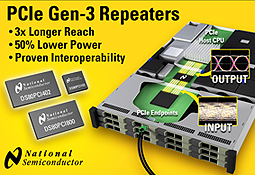Fuerstenfeldbruck/Germany – May 4, 2011

National Semiconductor Corp. introduced a new family of PCI Express® (PCIe) Gen-3 (8 Gbps) repeaters that offer unprecedented signal conditioning performance and low-power consumption for data center servers and storage systems. To see a video demonstration, visit bit.ly/DS80PCI402.
“PCI Express 3.0 increases the data rate to 8 GT/s, allowing Intel’s next generation desktop and server platforms to meet the I/O bandwidth demands of today’s applications,” said Dave Thompson, Platform Applications Engineer at Intel Corporation. “National Semiconductor’s PCIe repeaters address the tough signal integrity requirements of PCI-SIG receiver testing and are utilized to compensate for interconnect loss, ensuring an open eye.”
Successful PCI-SIG Interoperability Testing
National’s PCIe repeaters passed Gen-3 interoperability testing with Intel® server processors and multiple third-party PCIe controllers at the PCI-SIG® Compliance Workshop, held the week of April 18, 2011. The tests included link training and data transactions in x4, x8 and x16 configurations at Gen-1, Gen-2 and Gen-3 speeds.
Powered by National’s third-generation SiGe BiCMOS process, the new PCIe repeaters solve the signal integrity challenges presented by the 8 Gbps Gen-3 data rate. The DS80PCI102, DS80PCI402 and DS80PCI800 accomplish this by providing receive equalization gain up to 36 dB and transmit de-emphasis of 12 dB to deliver 3x the signal reach and half the power (65 mW/channel) of competitive devices. The PowerWise® repeaters breakthrough performance enables up to 40 inches of FR-4 backplane reach to simplify migration from Gen-2 to Gen-3 data rates, making it possible for system designers to use inexpensive, higher loss cable and board interconnects.
The DS80PCI402 enables implementation of x4 PCIe interfaces while the DS80PCI800 is ideal for higher density interfaces such as x8 and x16. The DS80PCI102’s x1 interface is well-suited for industrial and desktop applications. Each device supports seamless detection and management of the new Gen-3 transmit FIR handshake protocol and PCIe out-of-band signals (such as transmit idle/beacon and receive detect) without external system intervention. These features guarantee PCIe interoperability at both the electrical and system level, while reducing design complexity.
National’s PCI Express Gen-3 Repeater Family
The DS80PCI800 includes eight channels while the DS80PCI402 features four bidirectional lanes and the DS80PCI102 one bidirectional lane. Each device delivers 65 mW per channel typical power consumption and are easy to use, supporting a selectable 3.3V or 2.5V single-supply voltage with no reference clock required. The repeaters extend interconnect reach by performing both receive equalization and transmit de-emphasis on each lane to compensate for channel loss. This allows for maximum flexibility in physical placement within a system. A flow-through pin-out minimizes internal device jitter and allows for easy board layout. All three repeaters allow powering down of unused channels, and apply signal conditioning settings via pin selection, SMBus (I2C compliant) or directly from an EEPROM.
For more information on these PCIe Gen-3 repeaters, or to order samples and an evaluation board, visit www.national.com/pf/DS/DS80PCI800.html, www.national.com/pf/DS/DS80PCI402.html and www.national.com/pf/DS/DS80PCI102.html.
Pricing and Availability
Sampling now and offered in 10 mm by 5.5 mm, 54-pin leadless LLP® packages, the DS80PCI800 (8-channel) repeater is priced at $7.95 each and the DS80PCI402 (4-lane) is priced at $5.95 each. The single-channel DS80PCI102 is supplied in a 24-pin LLP package and is priced at $3.95 each. All prices are in small volume quantities. Production quantities will be available in the third quarter of 2011. For more information on National’s PCIe Gen-3 repeaters, please visit www.national.com/datacom.
National Semiconductor
www.national.com


